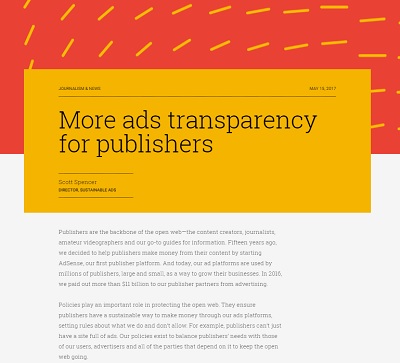Google has announced two updates to its AdSense network for publishers that aims to increase transparency and ensures minimum disruption.
In a blog post published on Monday, Google said it updated the technology behind AdSense so that ads can be pulled from individual web pages instead of a publisher’s entire website.
It is also gearing up to roll out a new platform dubbed “Policy Center” that will help website publishers better understand Google’s policies and rules governing AdSense.
The company said one of publishers’ top requests is for more transparency in how it responds to violations.
The first of the two updates is the ability to remove ads from content that violates Google’s policies at the page level.
This includes adult content, content that is derogatory or dangerous, and content that romotes drug use.
“Historically, for most policy violations, we remove all ads from a publisher’s site. As we roll out page-level policy action as the new default for content violations, we’ll be able to stop showing ads on select pages, while leaving ads up on the rest of a site’s good content,” Scott Spencer, director, sustainable ads at Google, said in a post.
This will cause fewer disruptions for publishers but if publishers continue to violate the terms, Google will still terminate their accounts with AdSense.
In 2016, Google removed more than 100,000 publishers from its AdSense program and claims it reviews thousands of sites for violations each day.
Alongside the increase in policing, Google has also launched a policy center for publishers that use AdSense.
The upcoming Policy Center will serve as a “one-stop shop for everything a publisher needs to know about policy actions that affect their sites and pages.”
The company has been testing Policy Center with thousands of AdSense publishers.
Scott Spencer added: “In just a few weeks, all AdSense publishers will have more transparency about why policy actions were taken and the violations found, including page-level action data, so they can quickly resolve these issues across all their sites and pages using step-by-step instructions. The Policy Center also makes it easy for publishers to tell us when policy issues have been resolved and their pages are ready for review.”
